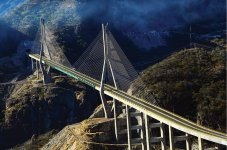Canada's infrastructure, coastal communities most at risk from climate change, gov't study
Reuters
Published:
July 4, 2019
Updated:
July 4, 2019 4:37 PM EDT
A government study showed Canada's physical infrastructure and coastal communities could face significant damage over the next 20 years due to climate change. Getty Images
Canada’s physical infrastructure and coastal communities could face significant damage over the next 20 years and top the list of areas most at risk by climate change, a government-backed study released on Thursday showed.
The study was commissioned by the Treasury Board of Canada Secretariat, the federal body in charge of government spending, and carried out by the Council of Canadian Academies (CCA), a nonprofit group that convenes academic experts for research purposes.
“Canada’s unique geographic, environmental, and social identity shapes the hazards that it faces and its exposure to climate-related risks,” Eric M. Meslin, president and CEO of the CCA, said in the press release.
The report is the first of its kind to prioritize the Canadian government’s response to climate change, according to the CCA. A study from Environment and Climate Change Canada published in April found Canada is experiencing effects of climate change at double the global rate.
Climate change has been a polarizing issue in the run up to Canada’s federal election in October. Prime Minister Justin Trudeau’s Liberal Party supporters rank it among their top concerns, while Conservative Party leader Andrew Scheer’s backers put it near the bottom of their list of priorities.
The report identified a total of 12 risk areas Canada faces in the next 20 years. In addition to physical infrastructure and coastal communities, other areas highlighted as top risks include human health and wellness, ecosystems and fisheries.
“All 12 risk areas could lead to significant losses, damages, or disruptions over a 20-year timeframe,” the report said.
The CCA assembled a panel of seven experts from the fields of economics, human health, earth sciences, social sciences, and climate change adaptation and risk assessment.
“This report represents a high-level approach to prioritizing those risks, which we hope will help inform decision making about adaptation strategies,” Meslin said.
Global boom in natural gas is undermining climate change action: Report
Police arrest 70 climate change protesters outside New York Times
Canada’s failure to fight climate change ’disturbing,’ environment watchdog says
http://torontosun.com/news/national...s-most-at-risk-from-climate-change-govt-study
Reuters
Published:
July 4, 2019
Updated:
July 4, 2019 4:37 PM EDT
A government study showed Canada's physical infrastructure and coastal communities could face significant damage over the next 20 years due to climate change. Getty Images
Canada’s physical infrastructure and coastal communities could face significant damage over the next 20 years and top the list of areas most at risk by climate change, a government-backed study released on Thursday showed.
The study was commissioned by the Treasury Board of Canada Secretariat, the federal body in charge of government spending, and carried out by the Council of Canadian Academies (CCA), a nonprofit group that convenes academic experts for research purposes.
“Canada’s unique geographic, environmental, and social identity shapes the hazards that it faces and its exposure to climate-related risks,” Eric M. Meslin, president and CEO of the CCA, said in the press release.
The report is the first of its kind to prioritize the Canadian government’s response to climate change, according to the CCA. A study from Environment and Climate Change Canada published in April found Canada is experiencing effects of climate change at double the global rate.
Climate change has been a polarizing issue in the run up to Canada’s federal election in October. Prime Minister Justin Trudeau’s Liberal Party supporters rank it among their top concerns, while Conservative Party leader Andrew Scheer’s backers put it near the bottom of their list of priorities.
The report identified a total of 12 risk areas Canada faces in the next 20 years. In addition to physical infrastructure and coastal communities, other areas highlighted as top risks include human health and wellness, ecosystems and fisheries.
“All 12 risk areas could lead to significant losses, damages, or disruptions over a 20-year timeframe,” the report said.
The CCA assembled a panel of seven experts from the fields of economics, human health, earth sciences, social sciences, and climate change adaptation and risk assessment.
“This report represents a high-level approach to prioritizing those risks, which we hope will help inform decision making about adaptation strategies,” Meslin said.
Global boom in natural gas is undermining climate change action: Report
Police arrest 70 climate change protesters outside New York Times
Canada’s failure to fight climate change ’disturbing,’ environment watchdog says
http://torontosun.com/news/national...s-most-at-risk-from-climate-change-govt-study
